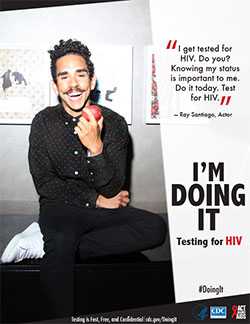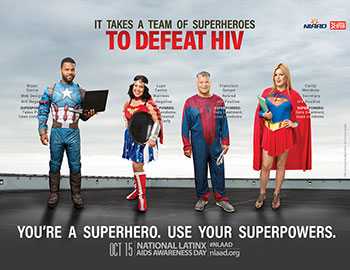National Latinx AIDS Awareness Day

October 15 is National Latinx AIDS Awareness Day,* coordinated by the Latino Commission on AIDS. This year’s theme, It Takes a Team of Superheroes to Defeat HIV, calls us to work side by side, using our most powerful treatment and prevention options to end HIV among Hispanics/Latinos.
HIV diagnoses are down among Hispanic women/Latinas overall, falling 16% from 2010 to 2014. Despite that good news, HIV diagnoses have increased 13% from 2010 to 2014 among Hispanic/Latino gay and bisexual men. In 2015, Hispanics/Latinos accounted for about one quarter of all HIV diagnoses in the United States, though they made up 18% of the total population. Today, HIV continues to be a serious threat to the health of Hispanic/Latino communities.
On this National Latinx AIDS Awareness Day, help us raise awareness, promote effective prevention and treatment strategies, and fight stigma about HIV. Join the team of heroes working to defeat HIV in Hispanic/Latino communities.

Doing It is a national HIV testing and prevention campaign designed to motivate all adults to get tested for HIV and know their status.

October 15 is National Latinx AIDS Awareness Day. Take action in defeating AIDS. Visit nlaad.org.
What Can Hispanics/Latinos Do?
Get the facts. Learn the facts about HIV and share this lifesaving information with others. You can learn more about how to protect yourself and your partner(s) and get information tailored to meet your needs from CDC’s HIV Risk Reduction Tool (BETA).
Get tested. We encourage every Hispanic/Latino to learn the basics about HIV testing and get tested for HIV at least once in their lifetime. Latinos/Latinas at higher risk should get tested more often.
To find a testing site near you visit Get Tested; text your ZIP code to KNOWIT (566948); or call 1-800-CDC-INFO (232-4636). You can also use a home testing kit available in drugstores or online. More resources on testing are available from the CDC Act Against AIDS Campaign, Doing It.
Protect yourself and your partner. Today, more tools than ever are available to prevent HIV. You can:
- Use condoms the right way every time you have sex. Learn the right way to use a male condom or a female condom.
- Choose less risky sexual behaviors.
- Limit your number of sexual partners.
- Never share needles or other equipment to inject drugs (works).
- If you are at very high risk for HIV infection, ask your health care provider about medicine that can prevent HIV (called pre-exposure prophylaxis or PrEP). If you are living with HIV, get and stay on treatment so you can stay healthy and protect your partner.
- Talk to your doctor about post-exposure prophylaxis (PEP) if you think you may have been exposed to HIV within the last 3 days through sex, sharing needles or works, or a sexual assault.
Get treated. If you are HIV-positive, take medicine to treat HIV as soon as possible. If taken the right way every day, HIV medication reduces the amount of HIV (viral load) in the body to undetectable levels. Getting and staying undetectable is not only the best thing people living with HIV can do to maintain their health, but also one of the best ways to prevent sexual transmission of HIV. We now know that people living with HIV who get and stay undetectable have effectively no risk of transmitting HIV to their HIV-negative sexual partners. Additional resources for persons living with HIV are available from the HIV Treatment Works campaign.
What Can CDC Partners Do?
Health departments, community-based organizations, and other partners can address stigma and discrimination, extend the reach of their HIV prevention and testing services that focus on Hispanics/Latinos, and link those who are HIV-positive to care. Learn how CDC can help you.
* The term Latinx serves as a gender-neutral alternative to Latino/Latina.
- Page last reviewed: October 13, 2017
- Page last updated: October 13, 2017
- Content source:
- National Center for HIV/AIDS, Viral Hepatitis, STD, and TB Prevention
- Page maintained by: Office of the Associate Director for Communication, Digital Media Branch, Division of Public Affairs




 ShareCompartir
ShareCompartir